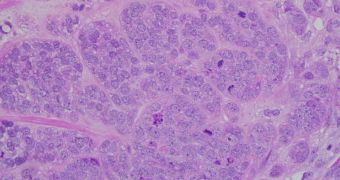An enzyme that plays an important role in regulating the development of a highly-aggressive form of cancer has just been identified, potentially providing researchers with a new avenue of research for creating a new series of treatments against the condition.
The enzyme PTPN23 was discovered by experts at the Cold Spring Harbor Laboratory (CSHL), in the United States. The molecule is part of a family called protein tyrosine phosphatases (PTP).
The enzyme's primary function is to switch cell signaling on or off. The CSHL investigators found out that when the expression of this molecule is stopped, then cancer cells tended to exhibit a type of behavior extremely similar to the process the leads to metastasis.
The latter occurs when cancer cells spread throughout the human body, affecting a large number of organs and systems. When PTPN23 was not expressed, the resulting cascade of effects led to cells breaking away from their anchors, scattering, and then invading the extracellular matrix.
CSHL Professor Nicholas Tonks, a global authority on PTP, says that the enzyme is capable of producing this important effect because its primary biochemical function is to remove phosphate groups from other molecules.
Together with colleague Senthil Muthuswamy, an associate professor at CSHL, and a researcher at the University of Torontom in Canada, Tonks managed to suppress no less than 105 PTP from a cell culture that was designed to resemble mammary epithelial tissue.
The team had the ability to stop the functioning of these molecules selectively, and this allowed them to identify three that allowed cancer cells increased motility when they were inactivated. PTPN23, which was one of the three molecules, was demonstrated to also cause the cells to become highly invasive.
“Considering the negative effect of PTPN23 on SRC [a type of kinase that causes cancer] activity, loss of PTPN23 may promote tumor growth and metastasis in breast tumors that are associated with activation of SRC,” the researchers write in a new paper.
Details of the work were published in the July 1 issue of the esteemed journal Genes & Development. The paper was entitled “Identification of PTPN23 as a novel regulator of cell invasion in mammary epithelial cells from a loss-of-function screen of the ‘PTP-ome’.”

 14 DAY TRIAL //
14 DAY TRIAL //